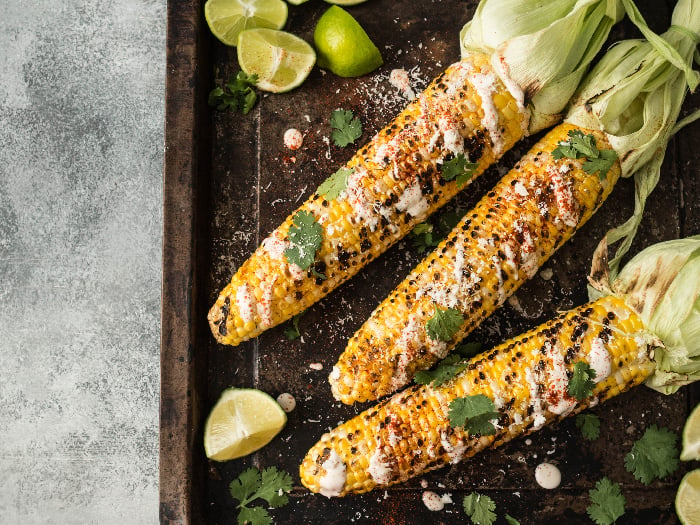For a vegetable that is so universally liked and eaten, corn does get its fair share of bad press. It’s a big no-no for people on a keto diet because it contains carbs. There are people who believe it will just add to their weight. Then there are concerns about a genetically modified product or GMO corn. Over the years corn has become associated with certain myths that are often negative in nature. Let’s address these common myths and find out if corn is good for you.
Is Corn Healthy?
Yes, it is. Corn is a starchy vegetable that is consumed by millions in many ways. Rich in antioxidants, vitamins, and other essential minerals, corn is a healthy addition to any meal. However, it has attracted a fair bit of negative reputation. As we find the truth, it is important to note that this article focuses on corn, the vegetable, and not its derivatives like high high-fructose corn syrup or corn oil.
You can read about these corn derivatives in our articles:

Is your grilled corn healthy? Photo Credit: Shutterstock
Myth #1: Most Corn is Genetically Modified
Yes, most corn in the US is genetically modified or GMO. But the good news is that we rarely eat the GMO corn. Most of the GMO corn is ‘field corn’ and what most of us eat is ‘sweet corn’, which is a different type. One research found that GMO sweet corn is extremely rare in American supermarkets. So, who is consuming all the GMO corn? According to the non-GMO Project, 90 percent of the corn grown in the US goes into biofuel and animal feed. The remainder goes into processed foods like high fructose corn syrup. [1] [2]
Myth #2: Corn is Full of Sugar
One of the persistent myths associated with corn is that it is full of sugar. The sweet taste of the vegetable further adds to this reputation. But while corn may be sweet for a vegetable, it is far from sugar-filled food of its myth. The sugar content in corn (6.26g/100g) is almost half of what you will find in a banana (12.23 g). At 6.76 g, even beets have more sugar than corn. However, the same is not true for corn derivatives. The sugar content in high-fructose corn syrup, which is found in a number of processed foods, is much like your regular table sugar. In addition, it can be bad for your heart and liver. [3] [4] [5] [6]
Myth #3: Corn Has Low Nutrient Value
While other vegetables may get top-billing for their nutrient value, corn rarely gets the same treatment. In fact, many people believe that corn lacks any substantive nutrient value. However, this is far from true. Corn is a good source for vitamin B and C, potassium, and magnesium. It also contains potent antioxidants carotenoids (particularly lutein and zeaxanthin) and flavonoids. [7] [8] [9]
Myth #4: Corn Has No Health Benefits
Thanks to the misconceptions about its nutrient value and high sugar content, corn is seen to contain no health benefits. While you may enjoy a lovely buttered grilled corn, many people believe that it will not give their health any boost. This is again not true. As we’ve mentioned above, corn contains vital antioxidants which makes it very beneficial for your health. Studies have shown that it is good for your heart and helps to manage diabetes and the digestive system. Carotenoids like lutein and zeaxanthin in corn can benefit your eyes. Read more about the health benefits of corn in our article Corn: Nutrition And Benefits. [10] [11]
Myth #5: Corn Can Cause Weight Gain
People who want to lose weight often shun corn because they think it results in weight gain. The reason for this reputation probably comes from the fact that it is seen as a ‘starchy’ vegetable. With the recent shunning of carbs, corn acquired an ill-deserved reputation. The ‘sweet’ factor did not help matters. But the truth is that medium-sized corn has less than 90 calories. The fiber at 2g goes some way in balancing these calories. [12]
The Final Word
So, is corn healthy? The answer is a definite yes as we have explored in detail. It’s reputation as a high-sugar, fattening vegetable is highly undeserved. In fact, it offers many health benefits. So, go ahead and grill that corn on the cob, add it to your salads, stews, and roasts.

